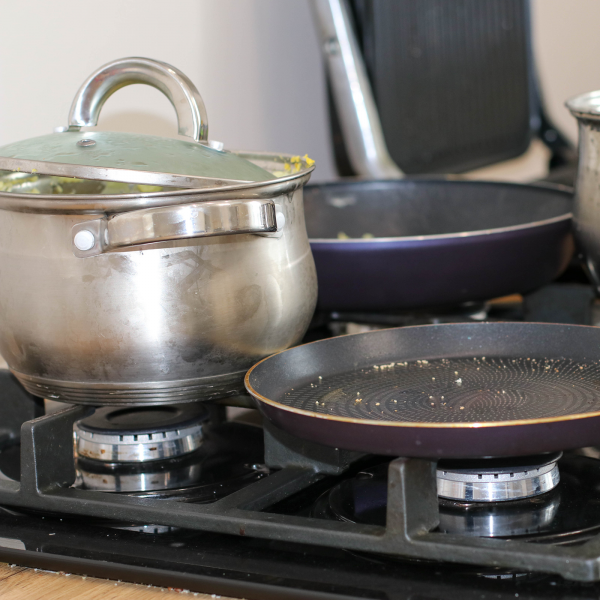With everyday dishes, cups or utensils, you can usually run them through the dishwasher and they’ll be clean and ready for reuse. Cookware isn’t always as straightforward. Some things (think cast iron pans) should never be put in the dishwasher. Some pans benefit from scrubbing them with steel wool, while that same approach would damage others. How should you clean each, to keep them looking good and to keep you and your family heathy? The trick is matching your cleaning approach to the material the pot or pan is made of.
Stainless Steel – To avoid warping, let your pans cool before washing. Then hand wash with dish soap, water and a soft sponge, followed by rinsing and drying. If you notice rainbow discoloration, try scrubbing it with some white vinegar.
Copper – Cleaning copper pots and pans is similar to cleaning stainless steel. What makes them different is the need for polishing. Copper will tarnish over time. To keep them looking shiny, polish them a few times a year with a copper cleaner.
Nonstick – Some nonstick pans are dishwasher safe and others are not. If you do not know the manufacturer’s recommendations, your best option is to wash by hand. Clean them with water and a mild dish soap, using a sponge or other soft scrubber to remove residue. If residue remains, soak it in warm soapy water and try again later.
Ceramic – Let the pan cool, then clean with some dish soap and a soft sponge. If there is still food residue, you can soak in warm soapy water. Once clean, rinse with hot water before drying.
Aluminum – For regular cleaning, aluminum can usually be put in the dishwasher. For deep cleaning, like cookie sheets used for roasting that have blackened, it needs some more care. One way to clean it is to make a paste of baking soda and water and spread it over your pan. Let it sit, anywhere from 10 minutes to overnight. Then, wad up some aluminum foil and use it to scrub the pan. Rub until the pan is clean, then wash with some water and dish soap, rinse and dry.
Cast Iron – Rinse with water as soon as it has cooled after using. Do not let the pan soak. A scraper is helpful to remove any bits of food left. Then clean with a drop of mild dish soap on a sponge (used sparingly, dish soap will not ruin the seasoning) then rinse and dry thoroughly.
With these cleaning tips, you can extend the life of your cookware and enjoy it for many years to come.


TELL US WHAT YOU THINK (0)